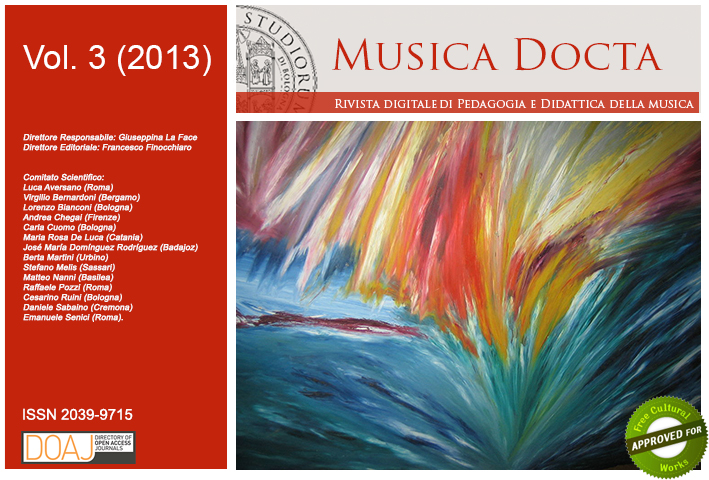A global vernacular? Musings on European art music in Hong Kong
DOI:
https://doi.org/10.6092/issn.2039-9715/4049Parole chiave:
East Asia, Hong Kong, European tradition, translation, post-colonialismAbstract
The presence of Classical European Music in higher education curricula in Tokyo or Beijing, Hong Kong or Singapore is a fact that barely registers to the eye (and ear) of a visiting teacher, especially a Western one. Daily engagement with university instruction over an extended period of time, however, soon reveals the complexity and significance of the adoption of European notation-based repertories, and the practices associated with them. As an “outsider-insider”, in this paper I sketch a picture of the opportunities and challenges of teaching the repertories of the so-called European “Common Practice” in contemporary East Asia. Drawing on a few case studies based on my experience in Hong Kong, Beijing, South Korea and Japan, I then consider the implications of the adoption of a recently imported musical language as the norm in music theory education as well as the pinnacle of artistic accomplishment in the fields of both composition and performance. Observing patterns of absorption of foreign cultural artifacts and sensibilities need not lead to sobering conclusions about cultural imperialism or thoughtless Westernisation.
Downloads
Pubblicato
Come citare
Fascicolo
Sezione
Licenza
Copyright (c) 2013 Giorgio Biancorosso
I diritti d'autore di tutti i testi nella rivista appartengono ai rispettivi autori senza restrizioni.
La rivista è rilasciata sotto una licenza Creative Commons Attribuzione Condividi allo stesso modo 4.0 Internazionale (codice legale completo).
Vedere inoltre la nostra Open Access Policy.
Metadati
Tutti i metadati dei materiali pubblicati sono rilasciati in pubblico dominio e possono essere utilizzati da ognuno per qualsiasi scopo. Questi includono i riferimenti bibliografici.
I metadati – riferimenti bibliografici inclusi – possono essere riutilizzati in qualsiasi formato senza ulteriori autorizzazioni, incluso per scopo di lucro. Chiediamo cortesemente agli utenti di includere un collegamento ai metadati originali.






